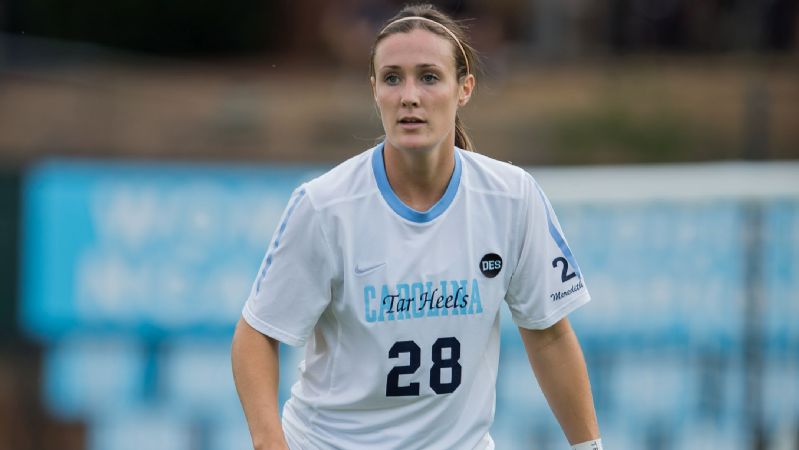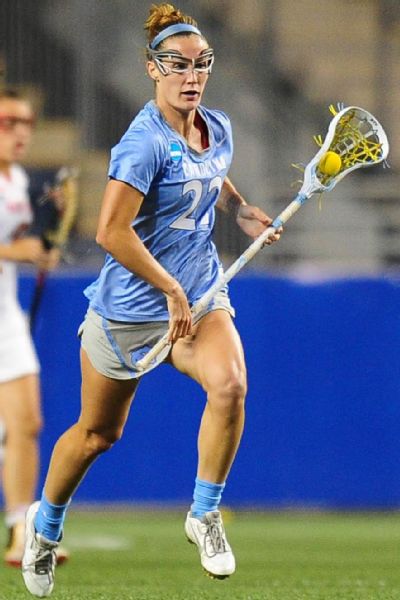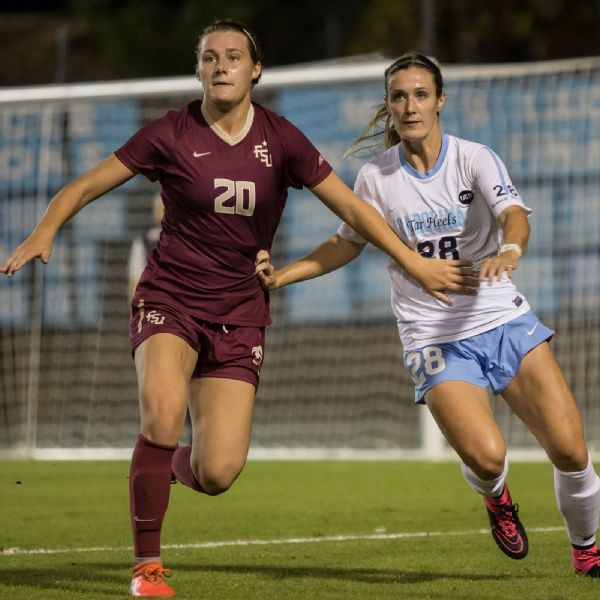Maggie Bill has mastered the art of the middle back for the Tar Heels, who play West Virginia on Friday in the College Cup semifinals.

SAN JOSE, Calif. — University of North Carolina coach Anson Dorrance has some experience when it comes to the NCAA Women’s College Cup. The coach has so much experience, in fact, that he has won three times as many national championships in the San Jose-Santa Clara area alone as the other three semifinalists now settling in at Avaya Stadium have won in total.
But even Dorrance hasn’t been a part of the season’s final weekend since 2012, the longest absence in his decades in charge of the dynasty from Chapel Hill. Not to worry. If he wants a refresher on how this all works, he need only ask Tar Heels redshirt junior defender Maggie Bill.
It was just six months ago, after all, that Bill celebrated an NCAA title. And it was just 18 months ago that she felt the sting of coming up one game — one goal — shy of that accomplishment.
Both moments came through lacrosse, a sport in which Bill is one of the best players in the college game. Good enough to have played for the United States women’s national team and nearly earned a roster spot on the team that will try to win a world championship next year. But if she is less well known in soccer, and if the position she plays was largely unknown to her until recently, these Tar Heels are competing for a 22nd NCAA soccer title because she is no dabbler.
“She’s one of the reasons we’ve had this kind of year,” said Dorrance, whose team plays West Virginia in Friday’s semifinals. “If she weren’t with us, I can’t imagine where we would be.”
That Bill can’t imagine life without both sports is why she is in California this week. The divided loyalties with lacrosse, which plays a spring season, aren’t unprecedented for the Tar Heels, but Bill is the first since Elizabeth Lancaster pulled it off a decade ago.

Maggie Bill is one of the best lacrosse players in the country. She might be North Carolina’s best professional prospect in soccer.
When it came to choosing a college, Bill recalled that a lot of lacrosse programs were hesitant to share the Long Island product with their soccer counterparts. A few flat-out told her they wouldn’t let her. She was ready to commit to lacrosse-power Northwestern, which was at least open to the two-sport idea if not, by her estimation, entirely enthusiastic, when her high school lacrosse coach advised her to check out North Carolina. In lacrosse coach Jenny Levy, who sought Dorrance’s counsel when she started her program from scratch two decades ago, she found someone who was not just willing but enthusiastic to make it work. So while Bill attends North Carolina on a lacrosse scholarship, her falls belong to soccer.
Whether Bo Jackson playing football and baseball at Auburn or Marion Jones competing in track and basketball at North Carolina, even great two-sport athletes are generally better in one sport than the other. In one, they dominate by physical ability. They are better than everyone else. In the other, they compete as if that should produce the same result. Sure enough, it often does.
Bill said Dorrance is often surprised at how much confidence a part-time soccer player shows.
“I have a little bit more confidence in my abilities with lacrosse, just because I have more, I guess, results to go off of with that,” Bill said. “I think I’ve definitely gotten more confident over the years. I’ve realized how a lot of preparing for games is mental and most of that is just confidence. That’s something I’ve worked on a lot, just making sure I believe in myself.”
That trust in herself is also part of the reason Bill wasn’t on the field when the Tar Heels won the lacrosse title earlier this year. After earning All-American accolades the previous season and leading the lacrosse team in scoring when it lost the title game by a single goal to Maryland, she redshirted the subsequent soccer season, in the fall of 2015. Then she did the same in the most recent lacrosse season, in the spring of 2016. She wanted to focus on academics, but she also knew she needed a mental break.
“I’ve been going and going since I was in maybe eighth grade, just constantly playing games, constantly practicing,” said Bill, who was competing in basketball, lacrosse and soccer at a varsity level by the time she was in middle school. “I’ve never really had a break. I’d have a month during December and a little bit of the summer, but I think I needed to take a step back and just kind of hit the reset button, I guess. I felt like I had a lot more to offer, both in soccer and lacrosse, and I think I needed to clear my head and focus more on my mental outlook and how I feel mentally in order to be able to perform the way I know I can athletically.

Coach Anson Dorrance says Maggie Bill has brought the confidence she gained from excelling in lacrosse to the soccer field.
“I think I could have played both seasons out and kept going, but I feel like I wouldn’t really be able to get closer to my potential.”
She continued to practice with both teams during their respective seasons. She was there outside Philadelphia when the lacrosse team won it all at the end of May. But stepping away from the actual games, from the mental energy required to prepare for and decompress from them, brought peace of mind.
Just as they were willing to share her, Dorrance and Levy were willing to wait for her.
With most of his lineup up for grabs after the departure of five seniors and the absences of three more likely starters because of the Under-20 World Cup or medical reasons, Dorrance was happy to have her back on the field this fall. And happy to continue to play her at center back despite a background that was almost exclusively as an attacking player until she got to Chapel Hill.
“We were trying to figure out a way to put a team on the field that could compete,” Dorrance said. “So we were looking at all the different pieces. We throw her in back there, and at first it was a bit rough — it wasn’t just rough for her, it was rough for the team.
“Slowly but surely, because she is an elite athlete but also incredibly coachable, she and the rest of the roster kept getting better.”
Bill plays between Julia Ashley and Hanna Gardner in the back of North Carolina’s trademark 3-4-3 formation. That isn’t an easy job even for someone who has the entire spring practice season to work at it. When the United States women’s national team recently experimented with a back three, co-captain Becky Sauerbrunn described it as intimidating. And Sauerbrunn is as good as there is in the world. Defenders in a three-back formation have less protection and more responsibility. Get it wrong and, well, things like a 3-0 loss to USC happen. But in the past eight games, spanning the regular-season finale against Florida State, the ACC tournament and the first four rounds of the NCAA tournament, the Tar Heels have conceded just a single goal.
Credit for that can be spread across the field, from Lindsey Harris in goal to the midfield work of players like co-captain Darcy McFarlane. But credit also the immovable object in the middle of the back line, a brilliant one-on-one defender nonetheless perfectly in sync with Ashley and Gardner.
Not bad for a part-timer.
“In addition to her athleticism, she also has this incredible composure about her,” McFarlane said. “Which says a lot about her as an athlete. She can come from her lacrosse season and jump into soccer right away and doesn’t skip a beat. She’s a really solid, composed presence in the back.”
She will be back on the lacrosse field this spring, although at Dorrance’s urging, professional soccer likely beckons when her time in Chapel Hill comes to an end. Should she finally pick a sport on which to focus fully, an idea that intrigues her, she may be North Carolina’s best pro prospect.
For now she is trying to heed the advice she would give the freshman version of herself.
“Don’t worry about yesterday or tomorrow,” Bill said. “I think it would just be to really stay in the moment because, to me, it’s gone so fast and I’ve had such a great time. But there are some moments where I wish I kind of was more present in that moment, instead of worrying about something else — how I played before or being nervous about a game in the future.”
That moment affords her an opportunity this weekend to be a part of a second national championship in a matter of months, this time from the field.





